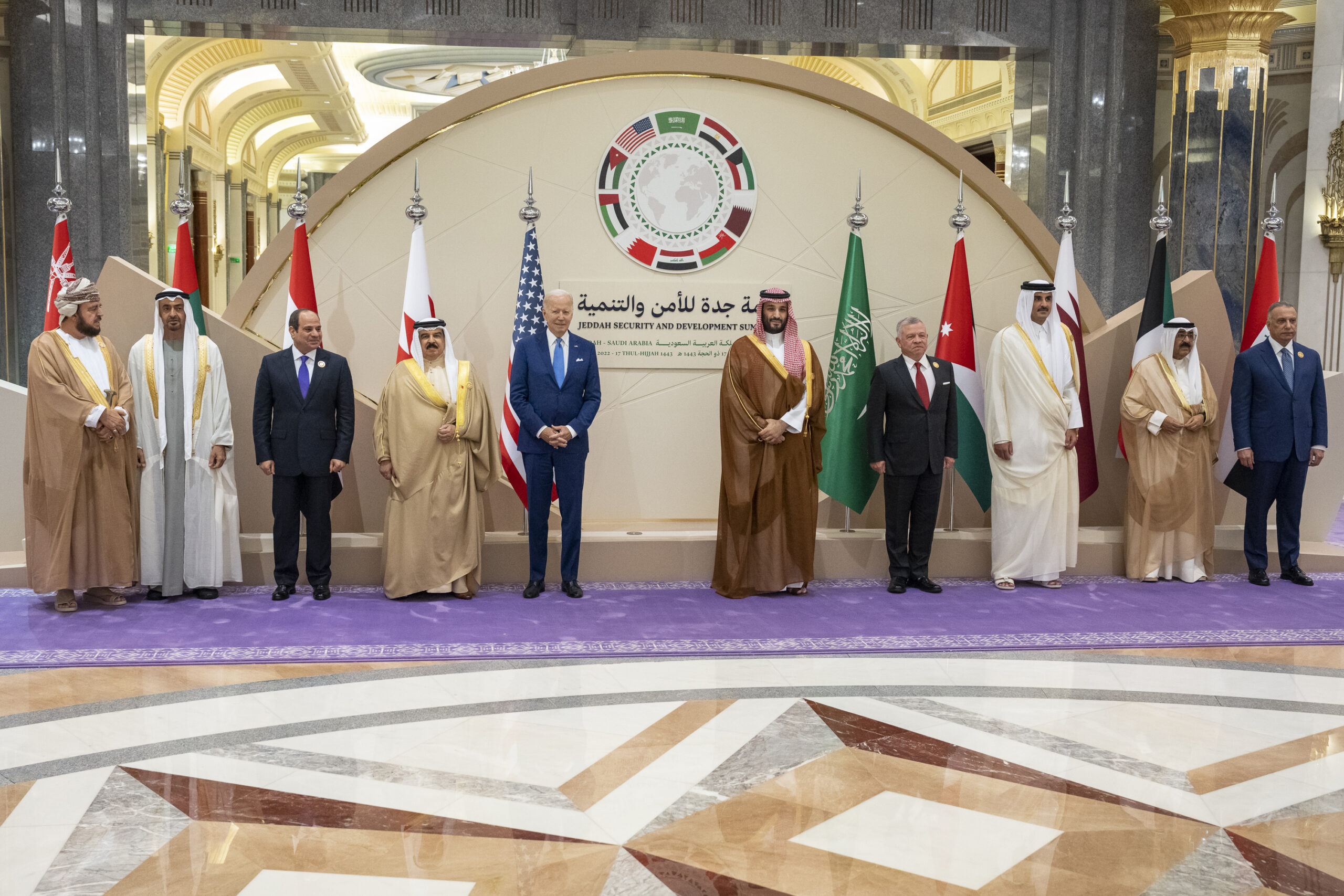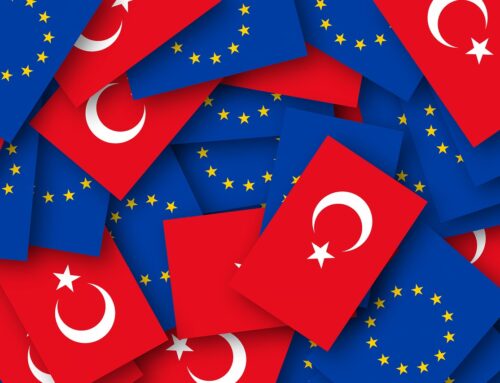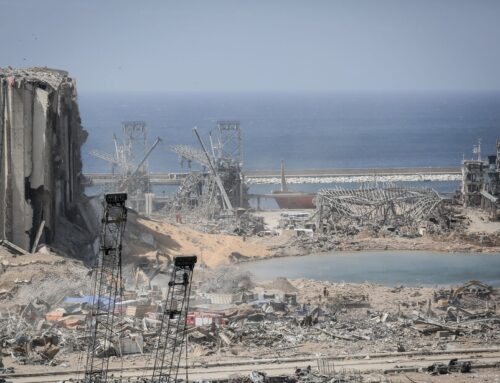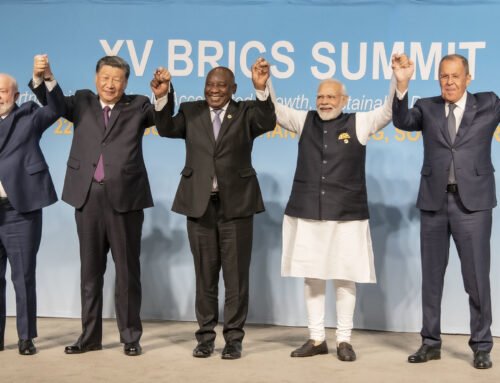President_Joe_Biden_stands_with_leaders_of_the_GCC_countries,_Egypt,_Iraq,_and_Jordan
Autor foto: Domena publiczna

Strategic Changes in Foreign Policy Saudi Arabia. Are they Permanent?
27 czerwca, 2023


President_Joe_Biden_stands_with_leaders_of_the_GCC_countries,_Egypt,_Iraq,_and_Jordan
Autor foto: Domena publiczna
Strategic Changes in Foreign Policy Saudi Arabia. Are they Permanent?
Autor: Robert Czulda
Opublikowano: 27 czerwca, 2023
Pulaski Policy Paper no 30, June 27, 2023
In recent times, Saudi Arabia – a longstanding strategic partner of the United States – has embarked on a new course in its foreign policy. Riyadh has intensified cooperation with China and drawn closer to the Shanghai Cooperation Organization. Now, the House of Saud is signaling readiness to join the anti-Western BRICS bloc.
When in March 2023 China successfully brokered an agreement between Saudi Arabia and Iran, it became evident to many commentators that a new era was beginning in the Middle East. This era is characterized by a growing, albeit not yet fully known and understood, role of China, for whom the Middle East plays an important role not only economically but increasingly politically as well. It also marked a symbolic beginning of a new era in Saudi Arabia’s foreign policy and security. Symbolic because Riyadh had already shown a diminishing desire to remain a passive partner of the United States, which has been systematically reducing its involvement in the Middle East.
In this context, it is worth mentioning decisions made by Saudi Arabia, such as its formal neutrality regarding the Russian aggression in Ukraine. As noted by Al Jazeera, Riyadh, like other Arab countries (with Syria being an exception), believe that this war is “a complicated European conflict, which does not require Arab states to stand against Vladimir Putin’s government (…)”.[1]
In May 2023, Syrian dictator Bashar al-Assad visited Riyadh and attended the Arab League summit (Syria was ousted from this organization in 2011 following a brutal crackdown on social protests and was reinstated only in May 2023). This is an undeniable success not only for Saudi Arabia, which aims to be the main player in the region, but primarily for the Iran-Russia camp, which unequivocally opposes the United States. Later, in June 2023, Riyadh hosted the 10th Arab-China Business Conference, which gathered over „150 speakers from ministers and leaders of major companies in China and the Arab countries,” and „more than 3,500 business and government leaders from China and across the Arab world to explore expansion and investment opportunities, amid warming diplomatic relations.”[2] During this meeting, Saudi Arabia unequivocally affirmed its willingness to closely cooperate with China economically, regardless of US dissatisfaction. At the summit, both states announced bilateral investments worth USD 10 billion in multiple sectors, including agriculture, mining, healthcare, and new technologies.
Riyadh’s aspirations to deepen its economic ties with China, and potentially strengthen political relations as well, are progressing further. Recently, it was reported that Saudi Arabia is now discussing its membership in the Shanghai-based New Development Bank, established in 2015 by five BRICS states (Brazil, Russia, India, China, and South Africa). With its financial wealth and energy resources, Saudi Arabia would be a valuable addition to this cooperation framework (Turkey and Egypt have also expressed interest in joining). As a member of BRICS , Saudi Arabia would enhance its global position and strengthen its economic, and likely political, connections with non-Western powers.
Major reasons of Riyadh’s strategic reorientation
Saudi Arabia’s growing independence from the West stems from several factors. Firstly, it is a result of rising aspirations of the Saudi decision-makers who no longer wish to be perceived as passive vassals of the United States. The actual ruler of the country, Crown Prince and Prime Minister Mohammed bin Salman Al Saud, presents himself as an active and ambitious leader. Within the strategic vision adopted in 2016, titled „Saudi Vision 2030,” he aims to enhance Saudi Arabia’s global position and influence. This long-term document clearly signals intentions to reduce Saudi Arabia’s dependency on oil. Riyadh aims to strengthen its economy and diversify it accordingly. As part of this plan, Riyadh now mandates that all foreign companies seeking governmental contracts establish their regional headquarters in Saudi Arabia.[3] Increased economic self-reliance is expected to be accompanied by increased political autonomy.
In other words, Saudi Arabia aims to replicate the path and success of Qatar, which has become a widely recognized, credible, and influential political and business partner, as well as an effective peacemaker, over the past 30 years. Additionally, Riyadh’s ambition to co-host the 2030 FIFA World Cup with Egypt and Greece is not insignificant.
Secondly, Saudi Arabia’s actions are a result of calculations and observations of the changing international situation. The United States has systematically decreased its interest in the Persian Gulf and the entire Middle East. The announced „Pacific Pivot” in 2011 and the withdrawal of forces from Afghanistan and most of Iraq serve as good illustrations of an evolving shape of regional Pax Americana. Regardless of who becomes a newly elected US president in November 2024, it is likely that the United States will continue its policy of decreasing interest in the region. Saudi Arabia recognizes a need to strengthen its autonomy and power to better navigate this situation.
US policy towards Riyadh also plays a role. As noted by Ibrahim Atta in the Gulf International Herald, Saudi Arabia realized in 2019, after Iran’s attacks on Saudi energy infrastructure, that it needed to change its pro-US orientation. The White House’s refusal to “to strike back or punish Iran for its belligerence (…) severely affected the leadership in Riyadh”.[4] When Donald Trump ceased to be the President of the United States, American-Saudi relations cooled down even further.
The Joe Biden administration unequivocally accused the regime of Mohammed bin Salman of the murder of Saudi journalist Jamal Khashoggi. When Saudi Arabia reduced oil production by 2 million barrels a day in October of last year, President Biden threatened Riyadh with „some consequences for what they’ve done”.[5] Furthermore, the White House implemented a ban on US sales of offensive weapons to Saudi Arabia.
At the same time, Beijing appears as a very attractive partner, not only because it does not raise human rights issues, which are equally abstract in China as they are in Saudi Arabia. Economic cooperation, which was mentioned earlier, is also significant. Riyadh has declared its readiness to meet China’s energy needs “not just for the next five years but for the next 50 and beyond”.[6] Furthermore, China could become an important supplier of weapons to Saudi Arabia. It has already been reported that Riyadh purchased $4 billion worth of arms last year. Now, it is believed that both states are in talks regarding potential sales of more military equipment, including the Chengdu J-10C multirole fighter jets.[7]
Conclusions
- The shift in Saudi foreign policy is not directly an attempt to act against the White House, although undoubtedly bilateral relations have further cooled since Joe Biden became President of the United States. However, this process was initiated during Donald Trump’s presidency, when Riyadh realized that the United States would not risk its own security to defend Saudi Arabia’s interests. A significant cooling of relations has increased Riyadh’s courage and readiness to boost its independence. This means that regardless of who becomes the future President of the United States, a likelihood of returning to the previous close US-Saudi partnership is very slim.
- The main reason for Riyadh’s strategic change is an attempt to enhance its own national position and sovereignty. It is also a result of perceiving a diminishing role of the United States in the region, along with the growing influence of China, which is capable of offering concrete benefits. Besides an absence of pressure regarding the lack of democracy in Saudi Arabia, there is also economic cooperation and political “gifts”, such as Beijing-brokered normalization of relations between Riyadh and Tehran. This deal is of crucial importance to Saudi Arabia, as it has long been concerned about the Iranian threat.
- On one hand, Saudi Arabia’s rapprochement with China could be beneficial for the Persian Gulf and the Middle East, and thus for the West. A condition for this is a long-term rapprochement between Saudi Arabia and Iran, as it would reduce regional tensions and provide a chance, albeit still uncertain, for building a more stable and peaceful region. Signs of this warming include a reopening of Iran’s embassy in Saudi Arabia (in June 2023) or an evacuation of 65 Iranian citizens from Sudan through Saudi Arabia in May 2023.
- At the same time, it is hard not to notice that China’s increased position negatively affects the interests of the United States, which, despite reducing their engagement in the Middle East, do not want to be completely pushed out of the region, especially in terms of military dimension. The United States still serves as a security guarantor for several Arab states. New Riyad’s foreign policy might weaken Pax Americana while simultaneously it would permanently strengthen authoritarian China, which poses a growing threat not only to the United States but also to Europe.
Author: Robert Czulda, Resident Fellow Casimir Pulaski Foundation
Supported by a grant from the Open Society Initiative for Europe within the Open Society Foundations
[1] Giorgio Cafiero, “Analysis: The Russia-Ukraine war and the view from Saudi Arabia”, Al Jazeera, October 24, 2022, https://www.aljazeera.com/news/2022/10/24/analysis-russia-ukraine-war-view-from-saudi-arabia.
[2] „Arab-China Business Conference underscores strengthening ties”, Gulf Business, June 13, 2023, https://gulfbusiness.com/arab-china-forum-closes-with-riyadh-declaration.
[3] Stefanie Hausheer Ali, „Saudi Arabia is requiring companies to establish headquarters in the kingdom. That strategy may pay off”, Atlantic Council, June 9, 2023, https://www.atlanticcouncil.org/blogs/menasource/saudi-arabia-headquarters-economy.
[4] Ibrahim Atta, “From Confrontational to Subtle Diplomacy: The Reorientation of Saudi Foreign Policy”, Gulf International Herald, no date, https://gulfif.org/from-confrontational-to-subtle-diplomacy-the-reorientation-of-saudi-foreign-policy.
[5] Karen DeYoung, „Biden’s ‘consequences’ for Saudi Arabia are reaping quiet results”, The Washington Post, November 5, 2022, https://www.washingtonpost.com/national-security/2022/11/05/biden-saudi-arabia-oil-ukraine.
[6] Adal Mirza, “Saudi Aramco to prioritise China for next 50 years”, Argus, March 22, 2021, https://www.argusmedia.com/en/news/2198029-saudi-aramco-to-prioritise-china-for-next-50-years.
[7] Jane Cai, „China said to be negotiating arms deals with Saudi Arabia and Egypt”, South China Morning Post, May 24, 2023, https://www.scmp.com/news/china/military/article/3221715/china-said-be-negotiating-arms-deals-saudi-arabia-and-egypt.






